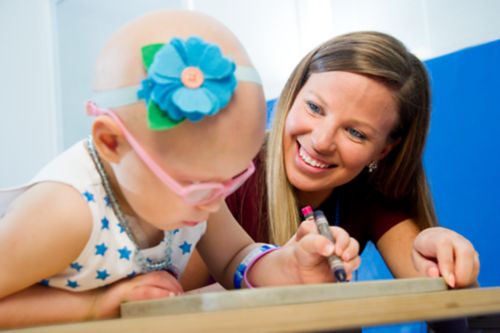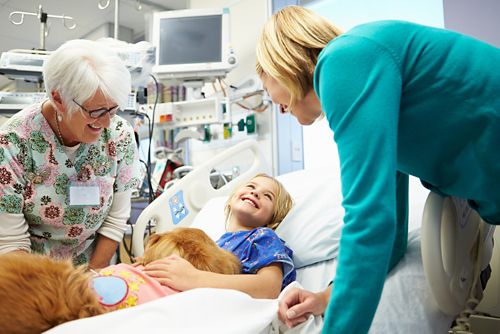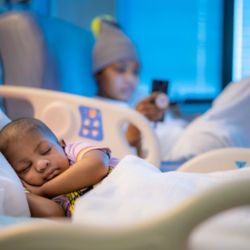How to Talk to Your Pediatric Oncologist About Integrative Medicine to Manage Side Effects
Cancer in children and teens affects the body, mind, and spirit. It also causes stress for parents, siblings, friends, and community members.
Cancer treatment can involve chemotherapy, radiation, and/ or surgery. Cancer itself or the therapies used to treat it can cause side effects. These may include pain, nausea and vomiting, anxiety, fatigue, constipation, and diarrhea.
As a parent, you want to help your child cope not only with the disease, but also with treatment side effects. Families look to many different providers and sources of information when their child is experiencing side effects.
A newer field of medicine known as integrative oncology uses non-traditional, but safe and effective methods, to help patients and families manage side effects. Integrative medicine is used alongside conventional cancer treatments.
Integrative medicine is used alongside conventional cancer treatments.
What is integrative oncology?
According to an article in the Journal of National Cancer Institute Monographs, integrative oncology:
- Is centered on the patient
- Is informed by evidence
- Uses mind-body practices, natural products, and/or lifestyle changes from different traditions in addition to traditional cancer therapies
The goals of integrative oncology are to promote health, improve quality of life, and empower patients to be active participants in their own health care.
What is the difference between integrative, complementary, and alternative medicine?
Complementary medicine
Complementary therapies are those that are used in addition to traditional cancer treatment.
Integrative medicine
Integrative health care brings conventional and complementary approaches together in a coordinated way. Integrative medicine means adding in (or integrating) complementary services (like massage or acupuncture) to standard chemotherapy, radiation therapy, and/or surgery for holistic treatment of patients with cancer.
Alternative medicine
You may also hear about “alternative medicine.” It usually includes medicine or procedures that have little evidence for safety or effectiveness and/or might be used instead of doing traditional cancer therapies. “Alternative therapies” are NOT recommended for children or teens with cancer.
Can integrative oncology be a part of childhood cancer care?
Several integrative strategies have shown usefulness during or after therapy for children and teens with cancer. These therapies may help improve mood, decrease anxiety, help with pain management, and improve relaxation.

These therapies may help improve mood, decrease anxiety, help with pain management, and improve relaxation.
Effective integrative medicine therapies may include:
- Massage therapy
- Mindfulness and relaxation techniques
- Yoga
- Acupuncture
- Biofeedback
- Music therapy
- Art therapy
Research studies show that the following therapies can be helpful in managing cancer-related side effects.
- Meditation, guided imagery, and yoga may decrease pain, nausea, and vomiting.
- Acupuncture can lessen pain and is especially useful for chemo-induced nausea and vomiting. Acupuncture for nausea/vomiting is now part of the standard cancer management guidelines for adults.
- Music, art, and play allow kids to express underlying emotions, develop more effective coping skills, and experience fewer side effects during their cancer treatment.
At present, there is no convincing evidence that any complementary health approach is effective in curing cancer or causing it to go into remission, according to the National Center for Complementary and Integrated Health.
Is it OK for children and teens to use herbal supplements during cancer treatment?
There is very little data about combining herbal medications or supplements with conventional chemotherapy in children with cancer. Adding in supplements may make your child’s chemotherapy or radiation not work as well or may make the side effects worse.
You are encouraged to discuss specific supplements with your child’s doctor before starting them. In general, most are not recommended while your child is actively receiving cancer— directed therapy.
Your care team wants the best for your child. They want to know what concerns you have so they can give you the best possible care. Providers can advise you about whether therapies will work well with the rest of your child’s treatment plan.
Many types of integrative medicine methods are safe and effective to treat side effects for pediatric cancer patients. But sometimes things that seem safe or are labeled as “natural”, such as certain foods or supplements, may interfere with your child’s cancer treatment. Other types of integrative medicine can be harmful if used in certain patients or times inappropriately. For example, pediatric massage can be helpful for muscle soreness, but massage therapists should avoid areas of the body that have been affected by disease or treatment. Acupuncture should be avoided if a patient has a low platelet count or a bleeding disorder.
Your child's care team can help you make decisions about integrative medicine

Providers can advise you about whether therapies will work well with the rest of your child’s treatment plan.
Sometimes parents may be hesitant to bring up integrative medicine with their child’s doctor. You may worry health care providers may not approve or understand.
But make sure to tell your child’s care team you are interested in integrative medicine. Don’t be afraid to ask questions and share your interests.
Your care team wants the best for your child. They want to know what concerns you have so they can give you the best possible care. Providers can advise you about whether therapies will work well with the rest of your child’s treatment plan.
Many types of integrative medicine methods are safe and effective to treat side effects for pediatric cancer patients. But sometimes things that seem safe or are labeled as “natural”, such as certain foods or supplements, may interfere with your child’s cancer treatment. Other types of integrative medicine can be harmful if used in certain patients or times inappropriately. For example, pediatric massage can be helpful for muscle soreness, but massage therapists should avoid areas of the body that have been affected by disease or treatment. Acupuncture should be avoided if a patient has a low platelet count or a bleeding disorder.
Questions to ask care providers about integrative medicine
If you are interested in exploring the use of integrative medicine during or after your cancer treatment, let your care team know before you begin.
Questions to ask your care team may include:
- Will integrative medicine interfere with my child’s treatment or medicines?
- Which specific therapies should I avoid?
- Can you help me understand these articles I found about complementary medicine?
- Does our treatment center offer integrative medicine services? How could my child take advantage of these services?
- Can you suggest a complementary medicine practitioner for me to talk to? Will you work with this practitioner?
- What types of integrative medicine will help my child feel better and deal with side effects?
- Will insurance pay for integrative medicine or are there resources to help pay it?
Integrative medicine for pediatric oncology patients is relatively new. Some cancer centers may have a dedicated program or department. Others may offer few or no integrative services but may be able to refer you to qualified professionals.
Integrative medicine allows parents and patients a sense of control
After a cancer diagnosis, families may feel a loss of control as they are catapulted into a world where a group of people they just met – doctors, nurses, and other health professionals – are making critical decisions about their child’s life.
Integrative medicine may allow families new strategies for management of side effects that are not medications. There are good medicines to help with cancer side effects, but many medicines cause additional side effects. It’s possible that using integrative approaches may mean your child won’t have to take as much medicine or that you as a parent can help make them feel better.
It all starts with talking with your care team. Together you can make a plan to help your child.





